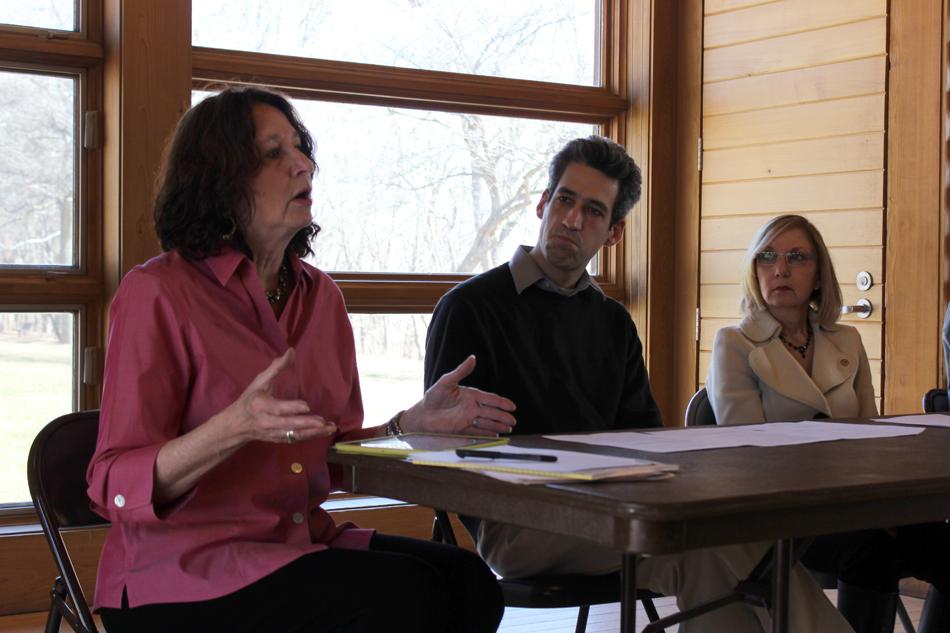State legislators ‘surprised’ by Evanston agricultural concerns
Kelly Gonsalves/Daily Senior Staffer
Anne Sills, a member of the Community Legislative Committee of school districts 65 and 202, talks at a community food discussion Sunday hosted by state Sen. Daniel Biss, center, and state Rep. Robyn Gabel, right, at the Evanston Ecology Center.
March 31, 2014
State legislators hosted a discussion Sunday to gather ideas for statewide agricultural legislation, but the conversation quickly turned to problems with Evanston and Skokie’s local food policies.
State Rep. Robyn Gabel (D-Evanston) and State Sen. Daniel Biss (D-Evanston) held the meeting at the Evanston Ecology Center, 2024 McCormick Blvd., to discuss positive examples of how the city handles locally grown food, policies which Biss commended as “significantly ahead of the national curve.” However, the roughly 20 people in attendance used the opportunity to express concern about rules that restrict residents’ ability to grow their own food and serve locally harvested food to children.
“I was expecting to hear the great examples that Evanston has in terms of local food policy,” Gabel told The Daily. “I was a little surprised that we do have these difficulties.”
Linda Kruhmin, farm operations manager of The Talking Farm, a nonprofit that helps to create urban farms, said the legal barriers to starting a farm discourage local agriculture. It took her organization more than three and a half years to open its two-acre farm on Howard Street due to legal “misunderstandings” with Skokie’s zoning and health departments, she said. Her team of pro bono lawyers spent over $300,000 worth of work helping her navigate these issues, she said.
“When I really realized the number — $300,000 to set up a farm to grow food, a lot of which we donate — that kills a lot of projects right off the bat,” Kruhmin said. “It shouldn’t take anywhere near those numbers.”
To combat this problem, Biss said the state should suggest examples of municipal codes that allow for more efficient legal proceedings for starting urban agriculture projects.
Many attendees also voiced concern about residents’ ability to harvest and serve locally grown food. Molly Martin, a Dawes Elementary School parent, said a policy that District 65 is considering would require all food served in public spaces to be commercially prepared and labelled, in compliance with the Illinois Department of Public Health’s existing food regulations.
“Of course we don’t want salmonella. We don’t want food allergies and things like this. However, none of these policies actually prevent any of that from happening,” Martin said. “They just shift liability.”
Martin said the rules would forbid a parent from cutting up a watermelon and bringing it to a school potluck, for example.
“This was a great meeting in terms of educating me about what’s going on in the community,” Gabel said. “The city is basing their rules on the Illinois Department of Public Health, so there is a role that the state plays in setting overarching public health rules.”
Gabel said she hopes to sponsor a resolution this year to support community-based strategies to reduce hunger and poverty. Encouraging grassroots collaboration and leveraging federal resources to support those grassroots projects will be at the heart of this resolution, said Bob Heuer, director of the Illinois Local Food, Farms and Jobs Council and lead writer of the proposed resolution.
“We’re realizing there really isn’t a comprehensive approach. There’s so many things … involved in the demand for local food, the access to local food, production and infrastructure,” Heuer said. “There’s no one taking a step back and looking at how all these things connect together, and really the place to start is at the municipal level.”
Email: [email protected]
Twitter: @kellyagonsalves


